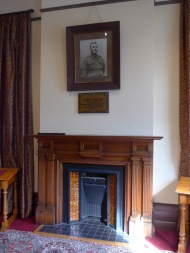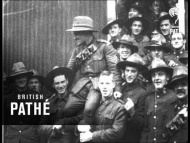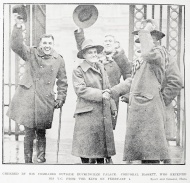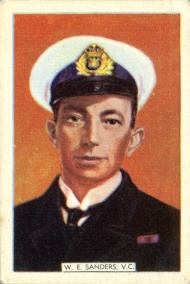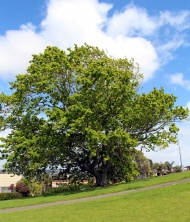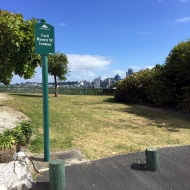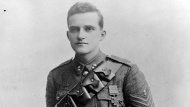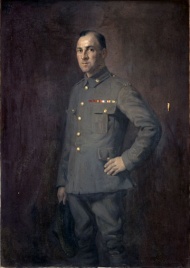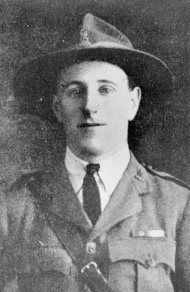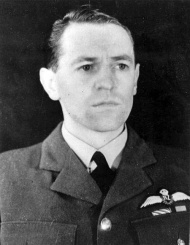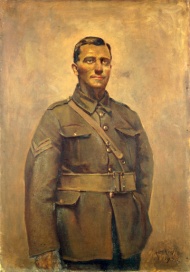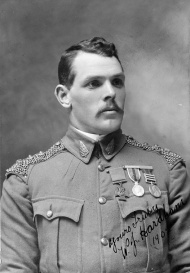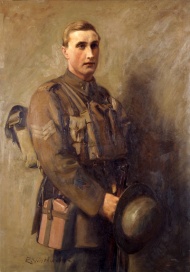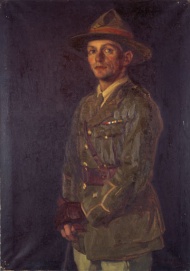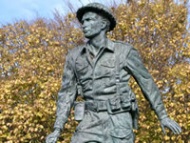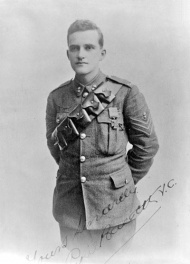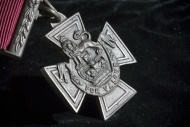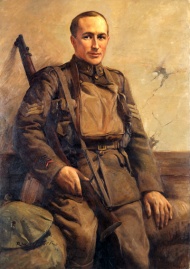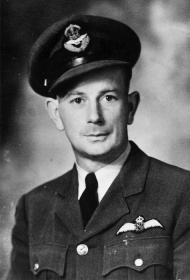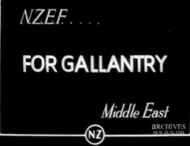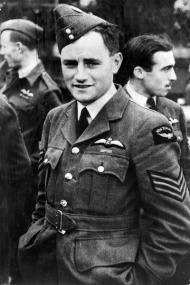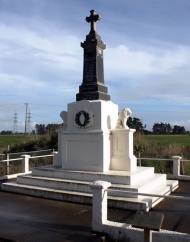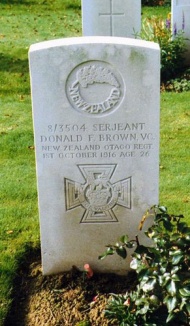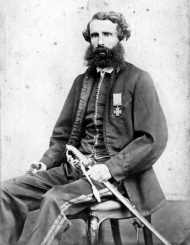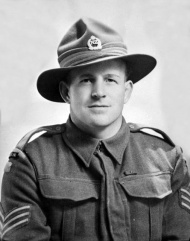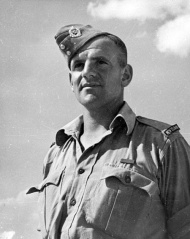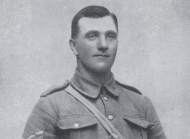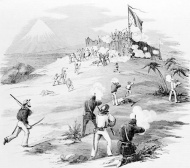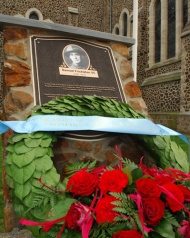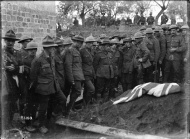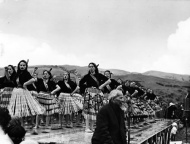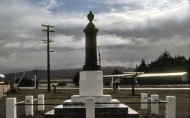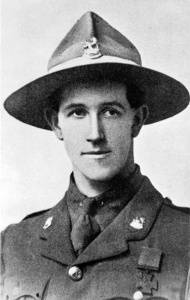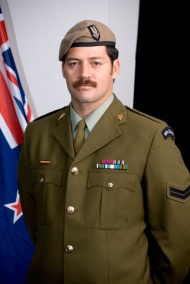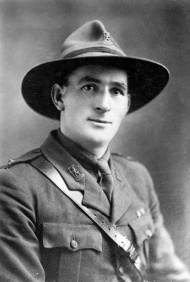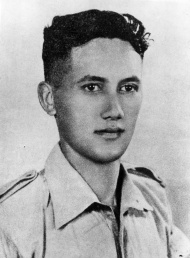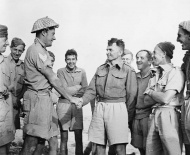Events In History
-
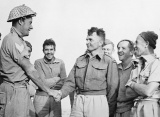 11 May 1945Charles Upham presented with first Victoria Cross
11 May 1945Charles Upham presented with first Victoria CrossNew Zealand’s most-decorated soldier, Charles Upham, received the first of his two VCs – for outstanding gallantry and leadership during the Battle of Crete in 1941 – from King George VI at Buckingham Palace. Read more...
-
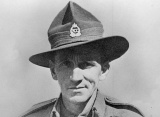 28 April 1941Jack Hinton awarded the Victoria Cross
28 April 1941Jack Hinton awarded the Victoria CrossSouthlander Jack Hinton was awarded the Victoria Cross for his actions on the night of 28 April 1941 at Kalamata during the evacuation from Greece. Read more...
-
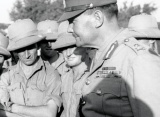 22 November 1939Freyberg given command of 2NZEF
22 November 1939Freyberg given command of 2NZEFBritish-born but New Zealand-raised, Lieutenant-General Sir Bernard Freyberg was a charismatic and popular military leader who later served as governor-general. Read more...
-
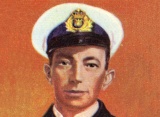 30 April 1917William Sanders awarded New Zealand's only naval VC
30 April 1917William Sanders awarded New Zealand's only naval VCWilliam Sanders received the Victoria Cross (VC) for bravery during a German U-boat (submarine) attack on his ship. He became the first – and only – New Zealander to win the British Empire’s highest military decoration in a naval action. Read more...
-
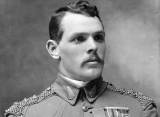 28 January 1901Hardham wins Victoria Cross in South Africa
28 January 1901Hardham wins Victoria Cross in South AfricaWellington blacksmith William Hardham served in South Africa with the fourth New Zealand contingent. He was the only New Zealander awarded a Victoria Cross during the South African War. Read more...
-
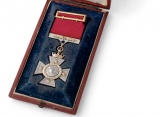 10 March 1869New Zealand Cross created
10 March 1869New Zealand Cross createdThis medal was created because members of New Zealand's colonial armed forces were not eligible for the Victoria Cross. Only 23 were awarded, making it one of the world‘s rarest military honours. Read more...
-
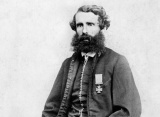 11 February 1864Charles Heaphy earns Victoria Cross
11 February 1864Charles Heaphy earns Victoria CrossRecommended for a Victoria Cross after rescuing a soldier under fire at Waiari, near Pirongia, Charles Heaphy was given the decoration in 1867. Read more...
Articles
New Zealand and the Victoria Cross
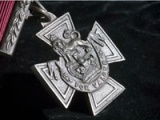
The Victoria Cross (VC) is the highest military decoration awarded for ‘valour in the face of the enemy’ to members of the armed forces of Commonwealth countries. A total of 22 VCs have been awarded to New Zealand military personnel, including two won by Charles Upham.
-
Page 2 – NZ Victoria Cross recipients
List of the 21 New Zealand Victoria Cross recipients, with links to citations
-
Page 3 – Victoria Cross recipients with NZ connection
List of New Zealand-born servicemen and those with New Zealand connections who served in other forces.
-
Page 5 – Further information
List of information sources on New Zealand's Victoria Cross winners
1918: Spring Offensive and Advance to Victory
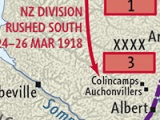
In 1918, a series of major German and Allied offensives broke the stalemate of trench warfare on the Western Front, resulting in the collapse of the German Army and the end of the war within the year. New Zealand units played an important part in the Allies' final push for victory.
- Page 1 - 1918: spring offensive and advance to victoryIn 1918, a series of major German and Allied offensives broke the stalemate of trench warfare on the Western Front, resulting in the collapse of the German Army and the end of the
New Zealand and Le Quesnoy

It was the New Zealand Division's final action of the First World War. On 4 November 1918, just a week before the Armistice was signed, New Zealand troops stormed the walled French town of Le Quesnoy. The 90 men killed were among the last of the 12,483 who fell on the Western Front.
- Page 2 - The liberation of Le QuesnoyThe capture of the French town of Le Quesnoy by the New Zealand Division on 4 November 1918 has special significance in New Zealand's military
British Empire
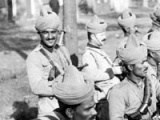
Key information and statistics about countries who fought as part of the British Empire during the First World War
-
Page 4 – Dominion of Canada
Key information and statistics about Canada during the First World War
-
Page 5 – British India
Facts and statistics about India during the First World War
-
Page 6 – Dominion of Newfoundland
Key information and statistics about the Dominion of Newfoundland during the First World War
-
Page 8 – United Kingdom of Great Britain and Ireland
Key information and statistics about the United Kingdom of Great Britain and Ireland during the First World War
Merchant marine
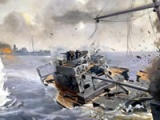
On 3 September New Zealand honours Merchant Navy Day. Here we explore the little-known but vital role played by the merchant marine during the First World War, when these civilian seafarers often found themselves in the front line of the war at sea.
- Page 3 - The Otaki's epic battleMany Home boats were lost, especially in 1917-18 when Germany stepped up its submarine warfare against Allied commerce. One action stood out, an epic battle between the New
Passchendaele: fighting for Belgium
-
Page 4 – After Passchendaele
Military events in Belgium after the Passchendaele offensive of October 1917, including the failed attack at Polderhoek
War in Taranaki 1860-63
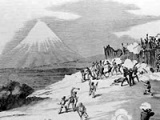
In March 1860 war broke out between Europeans and Māori in Taranaki following a dispute over the sale of land at Waitara. It was the beginning of a series of conflicts that would dog Taranaki for 21 years, claiming the lives of hundreds of people and leaving deep scars that persist to the present day.
- Page 4 - Fighting beginsThe opening shots of the Taranaki War were fired at Kīngi's new pā, Te Kohia – also known as the ‘L’ pa because of its shape – on 17 March
Māori and the Second World War
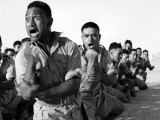
Despite some opposition, nearly 16,000 Māori enlisted for service during the Second World War. By 1945, 28 (Maori) Battalion had became one of New Zealand's most celebrated and decorated units. But Māori contributed to the war effort in many different ways, at home and overseas.
- Page 3 - AchievementsThe 28th (Maori) Battalion established a formidable reputation as one of New Zealand’s finest fighting
New Zealand's 19th-century wars
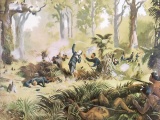
War changed the face of New Zealand in the 19th century. Many thousands of Māori died in the intertribal Musket Wars between the 1810s and the 1830s. There were more deaths during the New Zealand Wars of the 1840s to 1870s between some Māori and the Crown, which for many tribes had dire consequences.
- Page 7 - The Victoria Cross and the NZ WarsThere were 15 recipients of the Victoria Cross and 23 of the New Zealand Cross for action during New Zealand’s 19th-century
Biographies
-
 Freyberg, Bernard Cyril
Freyberg, Bernard Cyril
A First World War hero and commander of the 2nd New Zealand Expeditionary Force, Bernard Freyberg proved to be a charismatic and popular military leader who would later serve a term as Governor-General
Read more... -
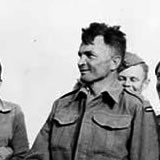 Upham, Charles Hazlitt
Upham, Charles Hazlitt
Charles Upham is probably New Zealand's most famous soldier. His actions in Crete in 1941 and Egypt in 1942 led to his becoming one of only three people – and the only combat soldier – ever to win the Victoria Cross twice.
Read more... -
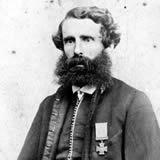 Heaphy, Charles
Heaphy, Charles
The multi-faceted Charles Heaphy made quite an impact on colonial New Zealand as an artist, explorer, soldier and colonial administrator. He was the first colonial soldier to win the Victoria Cross.
Read more... -
 Frickleton, Samuel
Frickleton, Samuel
Lance Corporal Samuel Frickleton took part in the attack on Messines, Belgium, on 7 June 1917 where his acts of extreme gallantry earned him a Victoria Cross.
Read more... -
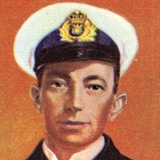 Sanders, William Edward
Sanders, William Edward
William Sanders commanded a submarine-decoy vessel in the First World War, and became the only New Zealander to win the Victoria Cross in a naval action.
Read more...
Related keywords
- wellington city
- oamaru
- donald brown
- battle of the somme
- WW1
- gallipoli campaign
- cyril bassett
- chunuk bair
- WW1 home front
- john grant
- hawera
- william sanders
- royal navy
- reginald judson
- howick
- memorials
- devonport
- battle of messines
- letters
- leslie andrew
- WW1 stories
- samuel frickleton
- south african war
- western front
- painting
- war art
- james crichton
- postal service
- george bowen
- new zealand cross
- henry laurent
- battle of waiari
- waikato wars
- charles heaphy
- new zealand wars
- leonard trent
- explorers
- royal new zealand air force
- WW2
- william hardham
- boer war
- samuel forsyth
- battle of bapaume
- amberley
- charles upham
- battle for crete
- roadside stories
- north african campaign
- jack hinton
- greece
- merchant marine
- merchant navy
- bernard freyberg
- italian campaign
- governor-general
- willie apiata
- richard travis
- lloyd trigg
- keith elliott
- royal air force
- james ward
- ryal bush
- taranaki
- battle of waireka
- australia
- british empire
- palestine campaign
- canada
- newfoundland
- clive hulme
- denny hulme
- wairarapa rugby
- war objects
- le quesnoy liberation
- polderhoek attack
- funerals
- canterbury infantry regiment
- statues
- maori in war
- apirana ngata
- maori battalion
- ngarimu
- colac bay
- passchendaele offensive
- belgium
- exploration
- surveyors
- art
- new zealand company
- haane manahi
- te arawa
- indian army
- egyptian expeditionary force
- egypt
- indians
- united kingdom
- british army
- france
- german army
- prisoners of war
- swimming
- united states
- french army
- casualties
- weapons
- armistice
- germany
-
Main image: Victoria Cross Memorial Plaque, Wellington
The bronze memorial plaque is one of 11 gifted to Victoria Cross recipients’ home countries.


